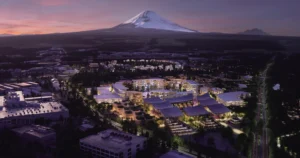“Tokyo’s Ambitious Implications and Debates Surrounding Tokyo’s Visionary £8 Billion Urban Project”
The Tokyo’s Ambitious world’s most futuristic smart city will likely be completed later this year. Toyota’s ambitious project, Woven City, is nearing fruition, which will see driverless cars serving as a testbed for innovative urban living.
Set just miles away from Mount Fuji on Honshū Island, Japan, Woven City is designed to be a sustainable utopia. First announced in 2021, Toyota has been diligently building the city, with the first residents expected to move in by year-end. This development coincides with progress on other megacity projects worldwide.
If reports are to go by, Woven City will be a living laboratory for Toyota’s experiments with renewable and energy-efficient self-driving vehicles, known as ‘E-palettes’. These vehicles will travel through the city on separate roads, distinct from pedestrian and cyclist paths. Toyota aims to use data from Woven City to improve its understanding of local traffic patterns.
In addition to driverless cars, Woven City will feature ‘smart homes’ equipped with sensors throughout the city, facilitating communication among residents, buildings, and vehicles. Powered primarily by hydrogen, the city aims to minimise emissions and become a leader in hydrogen-based technology.
President Akio Toyoda sees Woven City as an opportunity to develop advanced technologies, including a digital operating system for urban infrastructure. Traditional Japanese architectural styles will blend with modern robotics to create a unique living experience.

Initially, the city will be accommodating 360 residents, including Toyota employees. There are plans to expand and accommodate up to 2,000 individuals. With a footprint of 175 acres and a cost of £7.8 billion, Woven City has been marketed as a ‘mass human experiment.’
Toyota anticipates using data from Woven City’s driverless cars to improve understanding of traffic patterns. Furthermore, with most buildings running on hydrogen, Woven City prioritises sustainability and environmental responsibility.
By enabling connectivity and communication among people, buildings, and vehicles through data and sensors, the company aims to explore the capabilities of connected AI technology across virtual and physical domains, thereby maximising its potential.
The vision was officially conceived as a ‘living laboratory.’ Despite the traditional approach of constructing buildings in the city using ancient Japanese woodworking techniques, robots will undertake labour-intensive tasks. Toyota initiated construction of their Japanese metropolis in 2021, and after three years of progress, they anticipate its opening later in 2024.

